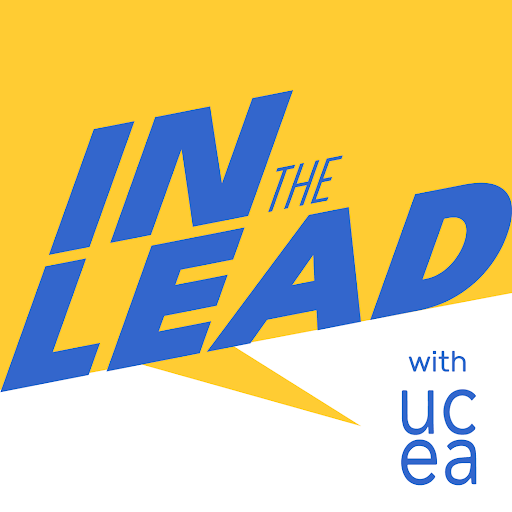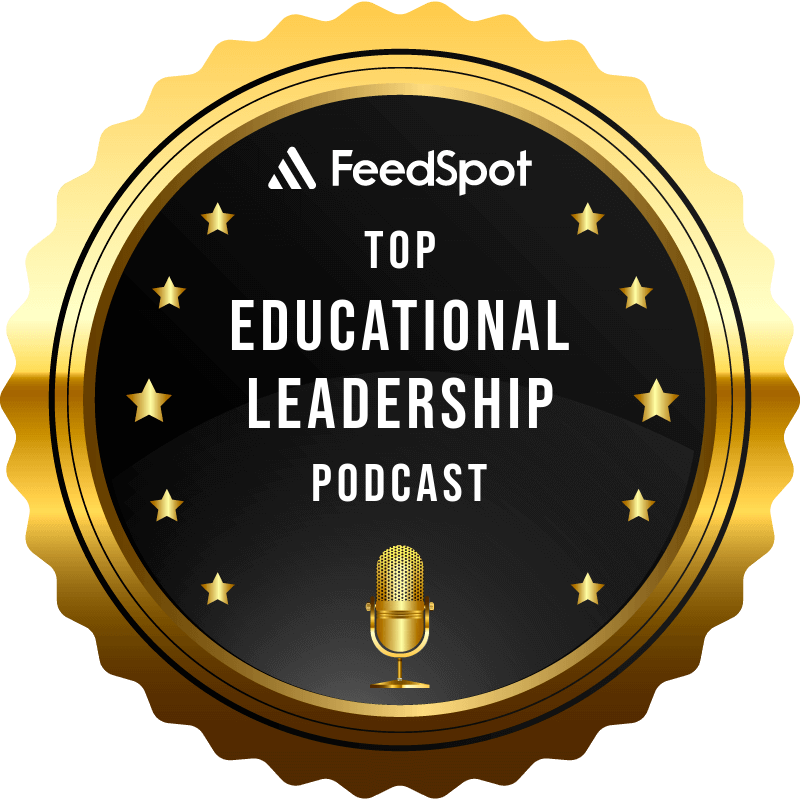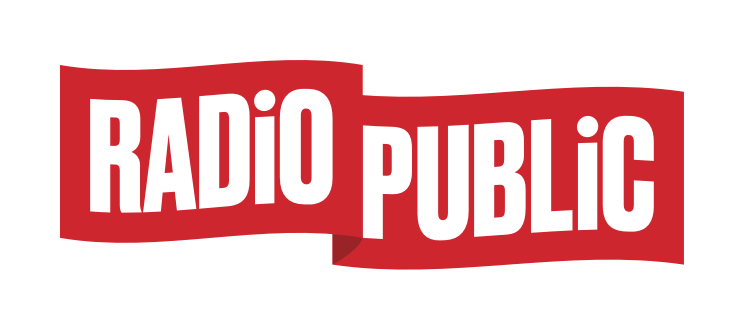UCEA Podcast
In the Lead with UCEA
SEASON 5: Improving Principal Preparation Through Equity-Focused District Partnerships

Episode 1: Pipeline to Progress: Juan Manuel Niño and UT San Antonio's Leadership Vision
Welcome back for season 5! In this episode of In the Lead with UCEA, Executive Director Dr. Mónica Byrne-Jiménez talks with Dr. Juan Manuel Niño, Professor of Educational Leadership and Policy Studies at UT San Antonio, where his research focusing on school district leadership, leadership preparation for social justice, latino leadership, and intersectionalities.
Mónica and Juan explore the history and development of the Urban School Leaders Collaborative (USLC) program, which began in 2003. The program focuses on equity-centered leadership and has expanded from a master’s degree program to include a Ph.D., with pathways now for both principals and superintendents. Juan illustrates the impact of the collaborative efforts between UT San Antonio and SAISD, highlighting the Equity Centered Pipeline Initiative (ECPI) supported by the Wallace Foundation.
SEASON 4

Episode 5: Steering Education Towards Effective Leadership with Paul Fleming
In this episode of In the Lead with UCEA, Executive Director Dr. Mónica Byrne-Jiménez talks with Paul Fleming, Chief Learning Officer at Learning Forward, where he works with states and districts to increase educator and leader effectiveness through student-focused, high-quality, professional learning.
Mónica and Paul discuss Learning Forward's international outreach, including their popular annual conference and strong membership base. Paul emphasizes the importance of cohesive principal pipelines and the educator lifecycle and also the significance of professional learning standards, their development process, and their adoption by states. Paul explains why aligning high-quality professional learning practices across educational systems and the critical partnerships between state agencies and higher education is necessary.
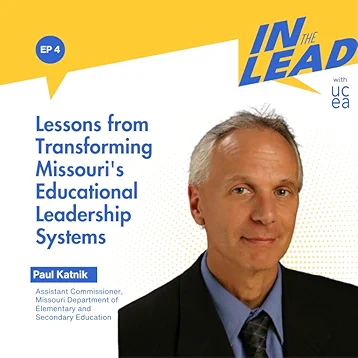
Episode 4: Lessons from Transforming Missouri's Educational Leadership Systems with Paul Katnik
In this episode of In the Lead with UCEA, Executive Director Dr. Mónica Byrne-Jiménez talks with Paul Katnik, Assistant Commissioner at Missouri Department of Elementary and Secondary Education, where he has been instrumental in coordinating the state model educator evaluation system.
Mónica and Paul discuss Paul’s role in the development and implementation of the Missouri Leadership Development System (MLDS) and the Missouri Teacher Development System (MTDS). Paul emphasizes the importance of a systemic approach to educator preparation, certification, and development, highlighting significant strides in teacher recruitment and retention. Paul also brings up the various challenges and successes of fostering statewide partnerships, using data to drive improvement, and continuously adapting to changing educational landscapes.
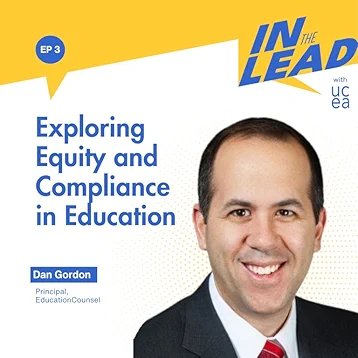
Episode 3: Exploring Equity and Compliance in Education with Dan Gordon
In this episode of In the Lead with UCEA, Executive Director Dr. Mónica Byrne-Jiménez talks with Dan Gordon, principal at EducationCounsel where he leads a variety of K-12 projects focused on advancing learning system approaches and supporting school districts to expand opportunities and accelerate improved outcomes for all students.
Mónica and Dan discuss the evolving role of federal involvement in education under the current administration, including themes of reducing federal influence and focusing on leveraging the remaining capacities to advance specific priorities. Their conversation touches on challenges such as preemptive compliance and the importance of separating significant policy changes from media noise. Dan also highlights opportunities for institutions to rethink and recommit to Diversity, Equity, and Inclusion initiatives amid policy shifts. The conversation ends on the optimistic point of the power of coalition building and sustained partnerships to protect and advance educational values.
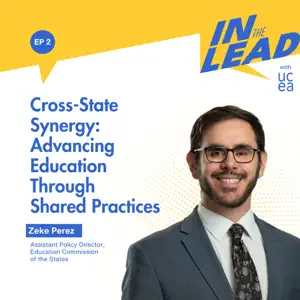
Episode 2: Cross-State Synergy: Advancing Education Through Shared Practices with Zeke Perez
In this episode of In the Lead with UCEA, Executive Director Dr. Mónica Byrne-Jiménez talks with Zeke Perez, Assistant Policy Director at the Education Commission of the States (ECS). Zeke âtracks legislation related to statewide longitudinal data systems, school safety, and post-secondary campus safety. He's also done recent comparisons of state strategies to support the preparation and development of high-quality school leaders.
Mónica and Zeke discuss the importance of connecting different role groups and states to share information and best practices in education. They highlight the cyclical nature of educational challenges from past decades, and their conversation emphasizes the need for collaboration and innovation among and across states to address persistent issues more effectively. Tune in to hear how ECS supports leaders in its ‘weaver’ role.
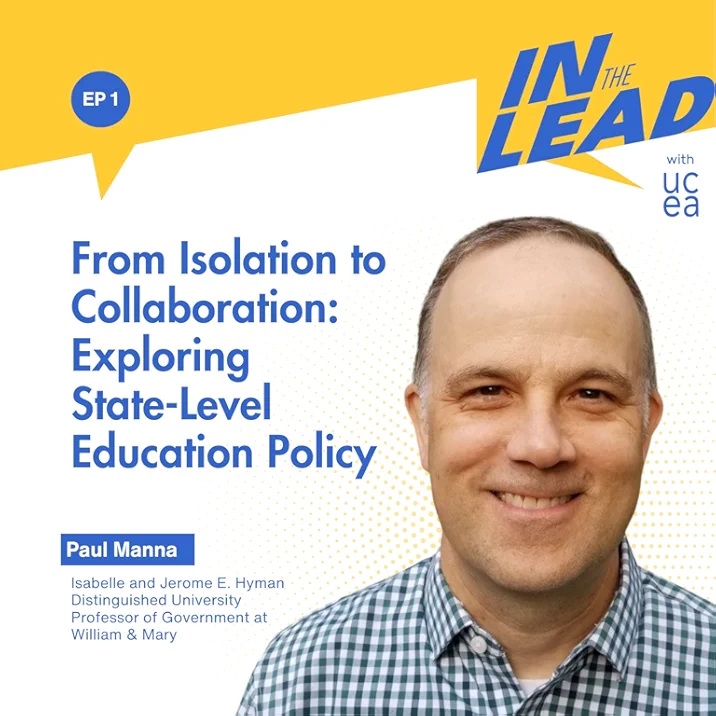
Episode 1: From Isolation to Collaboration: Exploring State-Level Education Policy with Paul Manna
In this episode of In the Lead with UCEA, Executive Director Dr. Mónica Byrne-Jiménez talks with Paul Manna, Isabelle and Jerome E. Hyman Distinguished University Professor of Government at William & Mary.
Mónica and Paul discuss Paul’s career focused on K-12 education, federalism, and policy reform. Paul shares his insights on how states act as educational policy actors and his recent work with the Wallace Foundation to support the preparation and development of high-quality principals. Their conversation also delves into the impact of state-level policies, the importance of leadership within education, and how educational institutions can better collaborate for effective policy implementation.
SEASON 3
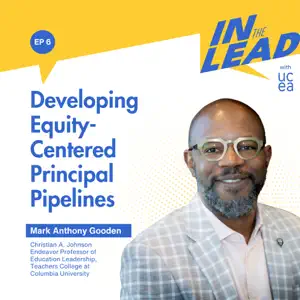
Episode 6: Developing Equity-Centered Principal Pipelines with Mark Anthony Gooden
In this episode of In the Lead with UCEA, Executive Director Dr. Mónica Byrne-Jiménez talks with Dr. Mark Anthony Gooden, Christian A. Johnson Endeavor Professor of Education Leadership, Teachers College, Columbia University, about the report he was lead author on, ‘A Culturally Responsive School Leadership Approach to Developing Equity-Centered Principals.’ and culturally responsive school leadership. Mark explores the origins, development, and impact of his report focused on anti-racist leadership and equitable educational environments.
Mónica and Mark discuss critical consciousness, inclusive pedagogy, and the importance of principal preparation programs, underscoring the necessity of continuous, collaborative partnerships between universities and school districts. Mark shares how Dallas and Houston ISDs demonstrate the benefits of such partnerships, emphasizing leadership supervision, instructional leadership, and pre-service principal preparation. They also address systemic issues, such as transportation inequities affecting Latinx students, advocating for consistent equity-oriented practices and vigilant support for educational leaders at all levels.
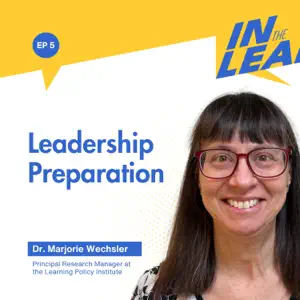
Episode 5: Leadership Preparation with Dr. Marjorie Wechsler
In this episode of In the Lead with UCEA, Executive Director Dr. Mónica Byrne-Jiménez talks with Dr. Marjorie Wechsler, the Principal Research Manager at the Learning Policy Institute, about the report she was co-author on, ‘Developing Effective Principals: What Kind of Learning Matters?,’ and the importance of high-quality learning for principal preparation and professional development.
With over 30 years of experience in policy research, Marjorie details the genesis and key findings of a report sponsored by the Wallace Foundation that explores features of effective principal preparation, access to learning opportunities, and the role of policy at the state and local levels. Marjorie emphasizes the importance of applied learning, mentorship, and district partnerships in shaping competent school leaders who can drive student success.
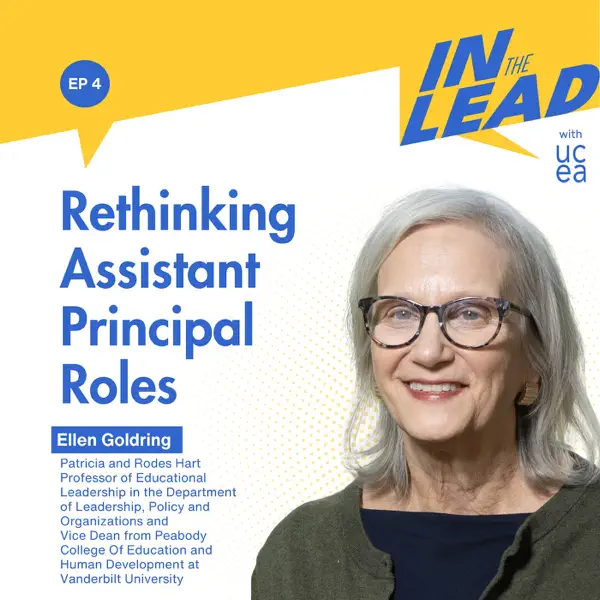
Episode 4: Rethinking Assistant Principal Roles with Ellen Goldring
In this episode of In the Lead with UCEA, Executive Director Dr. Mónica Byrne-Jiménez talks with Dr. Ellen Goldring, Patricia and Rodes Hart Professor of Educational Leadership in the Department of Leadership, Policy and Organizations and Vice Dean from Peabody College Of Education and Human Development at Vanderbilt University, about the report she was lead author on, ‘The Role of Assistant Principals Evidence and Insi,’ and in what ways the AP role could make more powerful contributions to educational equity, school improvement, and principal effectiveness.
They discuss the increasing number of AP roles and the growing complexity of their roles in educational leadership. Ellen explores the shift from their traditional image as disciplinarian to their important roles in community building and leadership development. The discussion also delves into disparities in career advancement for assistant principals, particularly among educators of color and women, and underscores the importance of mentorship and equitable opportunities for leadership progression.
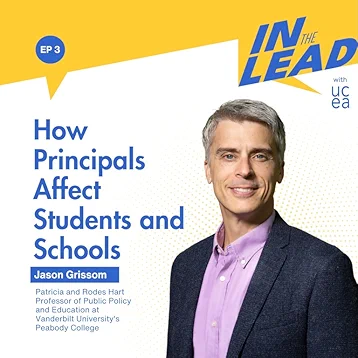
Episode 3: How Principals Affect Students and Schools with Jason Grissom
In this episode of In the Lead with UCEA, Executive Director Dr. Mónica Byrne-Jiménez talks with Dr. Jason Grissom, Patricia and Rodes Hart Professor of Public Policy and Education at Vanderbilt University's Peabody College and Faculty Director of the Tennessee Education Research Alliance, about the report he was lead author on, ‘How Principals Affect Students and Schools,’ a comprehensive synthesis of two decades of research commissioned by the Wallace Foundation.
Jason discusses how his research underscores the significant impact of principals on student learning outcomes and educational equity. Their discussion also delves into the importance of an equity lens in school leadership, essential skills for principals, and the future directions for research in this field.
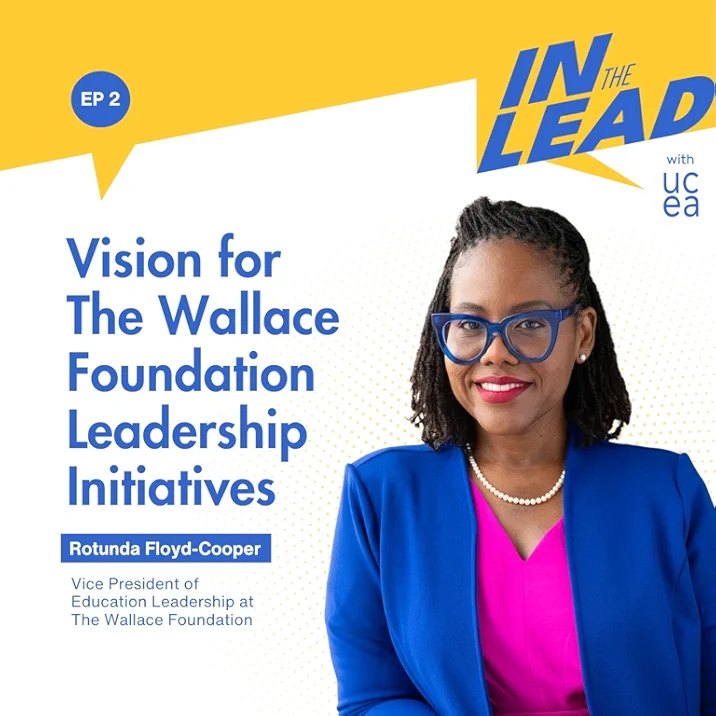
Episode 2: Vision for The Wallace Foundation Leadership Initiatives with Rotunda Floyd-Cooper
In this episode of In the Lead with UCEA, Executive Director Dr. Mónica Byrne-Jiménez talks with Dr. Rotunda Floyd-Cooper, Vice President of Education Leadership at The Wallace Foundation, about The Wallace Foundation’s Equity Centered Pipeline Initiative (ECPI), which aims to develop equity-oriented school principals across eight diverse school districts in the U.S.
The discussion explores the initiative's impact on educational leadership and practices, the critical role of community and university partnerships, and the unique, context-specific approaches to defining and implementing equity in education. Rotunda also shares insights into the continuous improvement processes and upcoming research findings that are expected in the future.
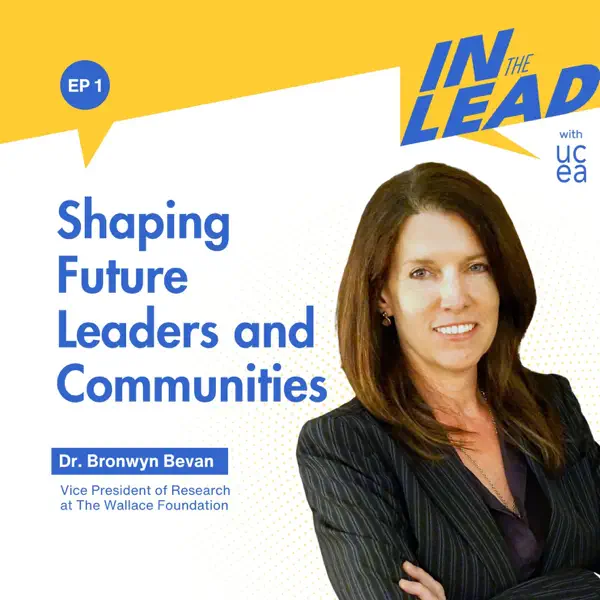
Episode 1: Shaping Future Leaders and Communities with Bronwyn Bevan
In this episode of In the Lead with UCEA, Executive Director Dr. Mónica Byrne-Jimenez talks with Dr. Bronwyn Bevan, Vice President of Research at The Wallace Foundation, about the foundation's learning strategies and research initiatives. Dr. Bevan elaborates on the foundation's focus areas: educational leadership, youth development, and the arts, highlighting their long-term goals or 'North Stars' for each area.
She also shares insights into the foundation's current initiatives, such as developing equity-centered leaders in education and supporting arts organizations founded by communities of color. Mónica and Bronwyn explore the interconnectivity of these focus areas and the strategies adopted by the foundation to innovate and document impactful change. Bronwyn also reflects on her own professional background and how it has influenced her work at the foundation.
SEASON 2
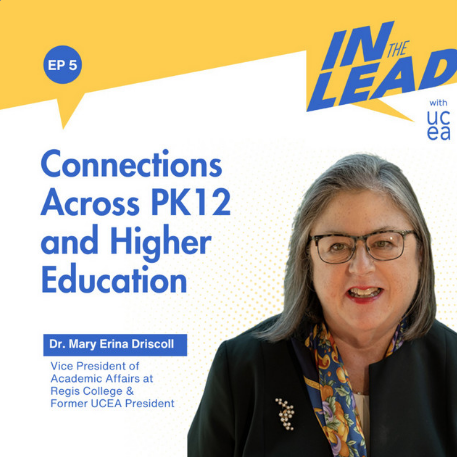
Episode 5: Connections Across PK12 and Higher Education with Mary Erina Driscoll
In this episode of In the Lead with UCEA, Executive Director Dr. Mónica Byrne-Jimenez talks with Dr. Mary Erina Driscoll, Vice President of Academic Affairs at Regis College, and president of UCEA from 1999-2000, about how her experiences in Catholic education and interactions with mentors shaped her dissertation on schools as communities. Mary provides a deep dive into UCEA's evolution from an exclusive club of doctoral institutions to an inclusive organization championing diversity and collaboration.
Leadership in education is a complex dance of balancing resources, advocacy, and communication. Drawing from her extensive experience as a dean and provost, Mary offers invaluable insights into the dynamics of leadership and partnership within higher education and its interplay with K-12 education. This episode is packed with practical advice and reflections. Listen in and gain a deeper understanding of the challenges and rewards of educational leadership and policy, all while celebrating the rich history and ongoing impact of UCEA.
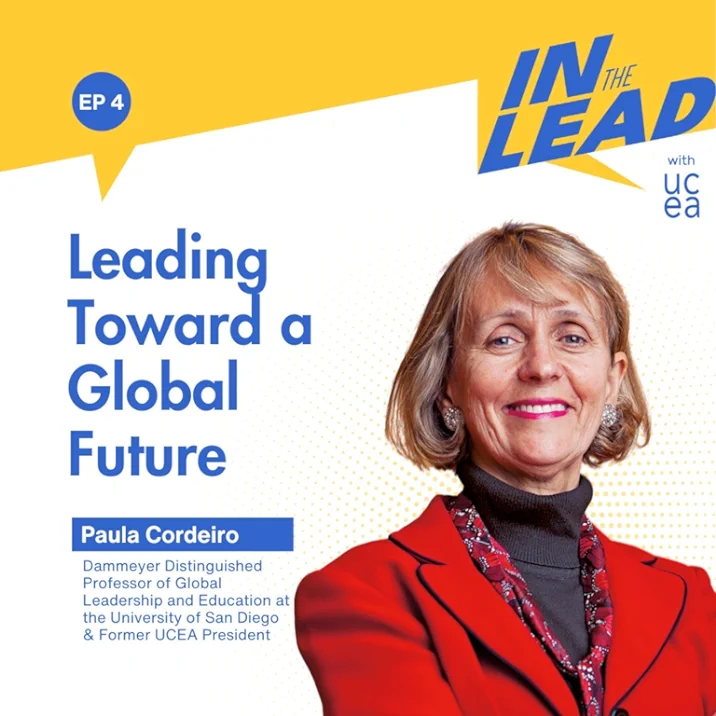
Episode 4: Leading Toward a Global Future with Paula Cordeiro
In this episode of In the Lead with UCEA, Executive Director Dr. Mónica Byrne-Jimenez talks with Dr. Paula Cordeiro, Dammeyer Distinguished Professor of Global Leadership and Education at the University of San Diego, and president of UCEA from 1997-1998, about the globalization of ed leadership, and how the field has expanded internationally. Paula shares how her own journey started with a US-centric approach and expanded to international horizons, emphasizing how she saw cultural diversity enrich the fabric of academia. Paula brings with her a treasure trove of experiences, discussing the milestones that have reinvented educational leadership and policy, as well as the vital role UCEA has played in pioneering this expansive vision.
Paula and Mónica dissect the profound impact of global partnerships, the significance of study tours, and how these experiences have the power to improve our understanding of our domestic education systems. Paula also reflects on what she thinks UCEA’s role will be in this field going forward into the future. Paula’s insights shed light on the importance of cultural understanding and the transformative power of international collaboration in shaping the educational leaders of both today and tomorrow.

Episode 3: Leadership in Uncertain Times with Gerardo R. López
In episode three Mónica talks with Dr. Gerardo R. López, Professor in the Department of Educational Administration at Michigan State University’s College of Education, and president of UCEA from 2019-2020, about the layers of challenges that hit scholars and practitioners unexpectedly with the onset of the COVID-19 pandemic, testing many in the field on their ability to master crisis management. Gerardo provides a compassionate and critical lens on the collective trauma endured by students, families, and educators, advocating for schools to morph into sites of healing.

Episode 2: Evolution of Leadership Frameworks and Theory with Michael Dantley
In this second episode Mónica talks with Dr. Michael Dantley, Dean Emeritus of Miami University College of Education, and president of UCEA from 2005-2006. They discuss his rich experience spanning five decades in Education. Michael talks about the seismic shifts that leadership theories have undergone in that time—from the once-dominant positivist models to today's more critical and inclusive frameworks. Michael's insights shine a spotlight on how critical race theory and feminist perspectives have reshaped our understanding of educational leadership.
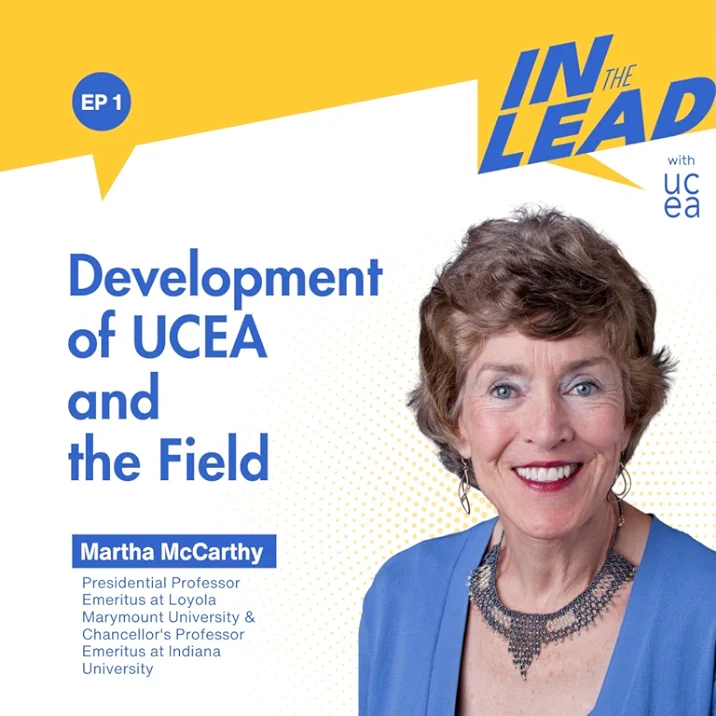
Episode 1: Development of UCEA and the Field with Martha McCarthy
In this first episode of season two, Mónica Byrne-Jimenez talks with Dr. Martha McCarthy, Presidential Professor Emeritus at Loyola Marymount University and Chancellor's Professor Emeritus at Indiana University, about her insights on the evolution of educational leadership and UCEA's role in shaping it. Martha discusses pivotal moments in leadership, the impact of funding on research and practice, and the importance of UCEA Conventions in fostering community and advancing the field. The conversation also touches on equity and social justice, the changing demographics of educational leadership faculty, and the personal impact of UCEA on Martha's career.
SEASON 1: Faculty Insights from the Wallace University Principal Preparation Initiative
This inaugural season of UCEA’s podcast lays out several important elements of UPPI from the perspective of the faculty involved in this innovative approach to program redesign.
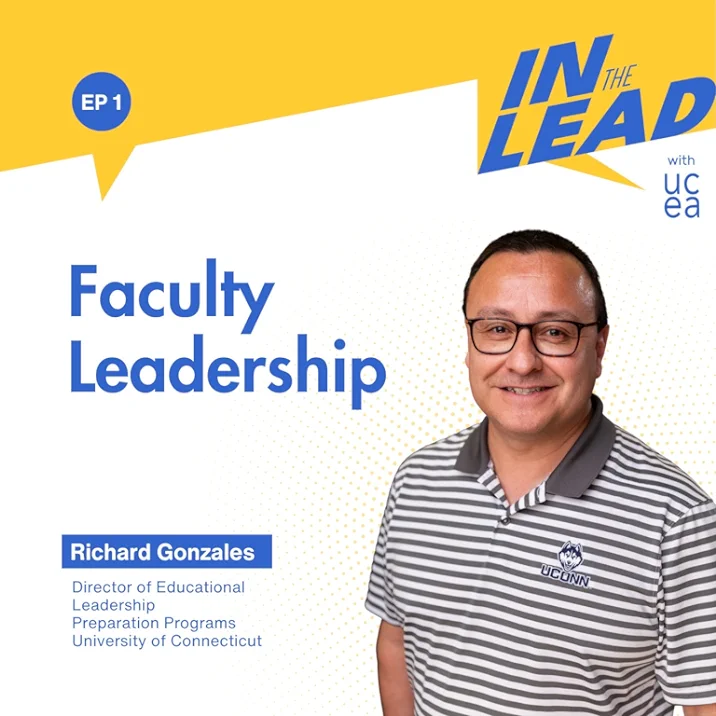
Episode 1: Faculty Leadership with Richard Gonzales
In our inaugural episode, Mónica chats with Richard about faculty members’ roles in leading program redesign. Their conversation highlights the value of strengthening trust and relationships among program faculty, along with a collective commitment to program improvement.

Episode 2: Partnerships in UPPI with Daniel Reyes-Guerra
In a similar vein, this episode explores relationship building among UPPI partners: preparation programs, school districts, and mentor prep programs. Although challenges arose across differing organizational cultures, relationship building ultimately strengthened the ability of the partners to serve the needs of all stakeholders.
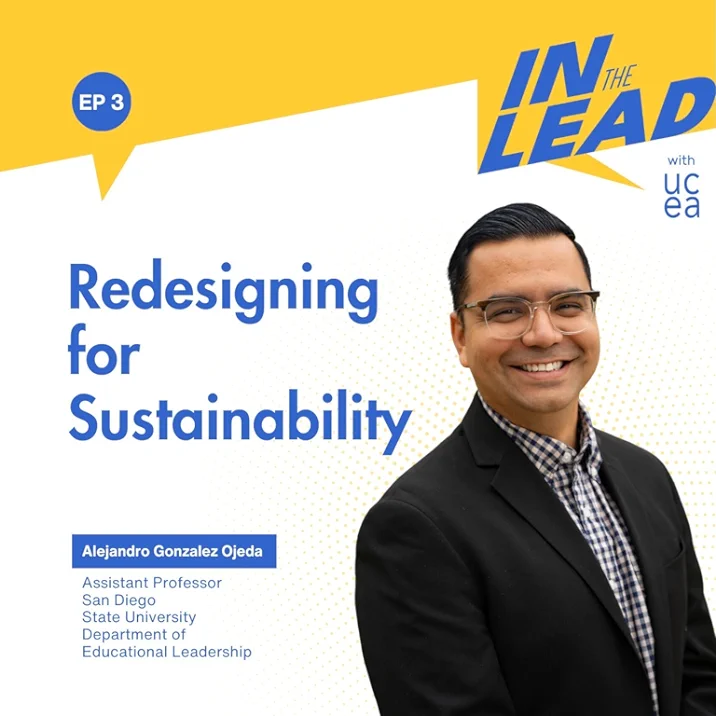
Episode 3: Redesigning for Sustainability with Alejandro Gonzalez Ojeda
Improvement in the short term is important, but sustainability of improvements is essential to long-term success and viability. Mónica and Alejandro discuss the importance of developing and implementing a long-term collective vision for program improvement.
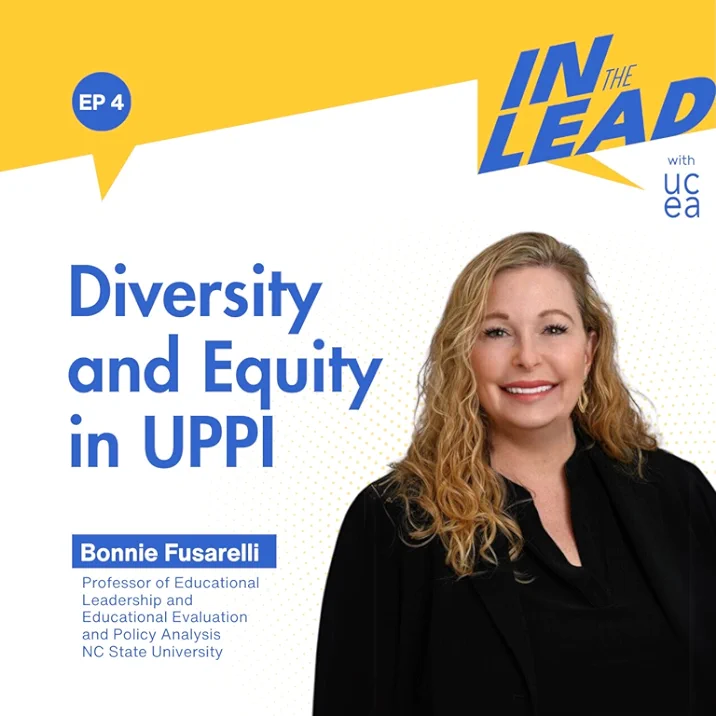
Episode 4: Diversity and Equity in UPPI with Bonnie Fusarelli
Programs kept equity at the center of every stage of the program redesign process. Through a multilayered, iterative process involving strategies like community dialogue and self reflection, Bonnie and her colleagues at NC State envisioned and worked toward collective equity goals for their program.
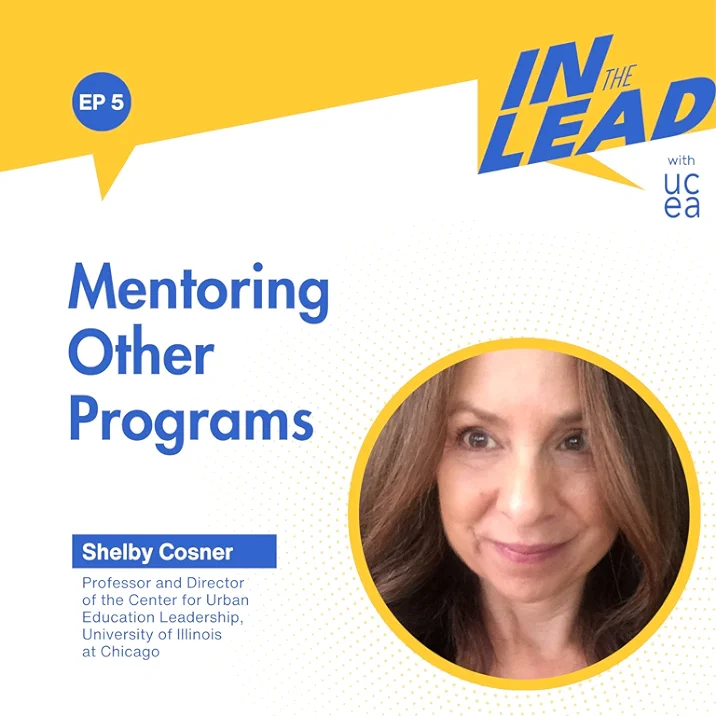
Episode 5: Mentoring other Programs with Shelby Cosner
While program redesign for equity is deeply challenging, support from programs who have been there before made a big impact on UPPI programs. Mónica and Shelby discuss the cycles of inquiry approach that the University of Illinois-Chicago took to supporting its partner at the University of Connecticut.
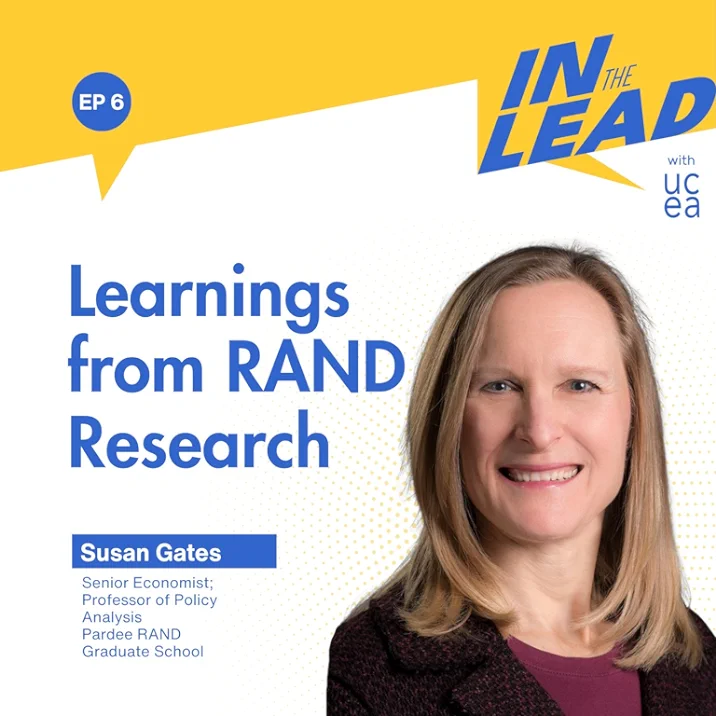
Episode 6: Learnings from RAND Research with Susan Gates
From start to finish, UPPI maintained an important collaborative research relationship with RAND, which conducted two research studies on UPPI, one at the launch in 2018 and another at the conclusion in 2022. In Episode 6: Learnings from RAND Research, Susan Gates reflects on her experiences studying UPPI and unpacks some of the most important insights from the initiative.
